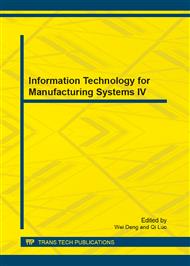[1]
G. Alpan, M.A. Jafari: Dynamic analysis of timed Petri nets: a case of two processes and a shared resource. IEEE Trans. on Robotics and Automation, Vol. 13, No. 3 (1997) 338-346.
DOI: 10.1109/70.585897
Google Scholar
[2]
M., Beaverstock, A. Greenwood, E. Lavery, W. Nordgren: Applied Simulation, Modeling and Analysis usinf Flexsim, Flexsim Software Products, Inc. Orem, USA (2011).
Google Scholar
[3]
G. Bocewicz, Z. Banaszak, R. Wójcik: Design of admissible schedules for AGV systems with constraints: a logic-algebraic approach. Lecture Notes in Artificial Intelligence 4496, Springer-Verlag (2007) 578–587.
DOI: 10.1007/978-3-540-72830-6_60
Google Scholar
[4]
G. Bocewicz, R. Wójcik, Z. Banaszak: A reference model of AGVs cyclic scheduling problems: declarative approach. In: Information Systems Architecture and Technology – System Analysis Approach to the Design, Control and Decision Support, Świątek J., et al. (Eds. ), Wrocław (2011).
Google Scholar
[5]
M.A. Lawley, S.A. Reveliotis, P.M. Ferreira: A correct and scalable deadlock avoidance policy for flexible manufacturing systems. IEEE Trans. on Robotics and Automation, Vol. 14, No. 5 (1998) 796-809.
DOI: 10.1109/70.720355
Google Scholar
[6]
E. Levner, V. Kats, D. Alcaide, L. Pablo, T.C.E. Cheng: Complexity of cyclic scheduling problems: A state-of-the-art survey. Computers and Industrial Engineering, Vol. 59, Issue 2, (2010) 352-361.
DOI: 10.1016/j.cie.2010.03.013
Google Scholar
[7]
M. L. Pinedo: Planning and scheduling in manufacturing and services. Springer-Verlag, New York (2005).
Google Scholar
[8]
M. Polak, P. Majdzik, Z. Banaszak, R. Wójcik: The performance evaluation tool for automated prototyping of concurrent cyclic processes. Fundamenta Informaticae. ISO Press, 60(1-4), (2004) 269–289.
Google Scholar
[9]
P. Sitek, J. Wikarek, A Declarative Framework for Constrained Search Problems. New Frontiers in Applied Articial Intelligence, Nguyen, NT., et al. (Eds. ), Lecture Notes in Artificial Intelligence LNAI, Vol. 5027, Springer-Verlag, 2008, 728-737.
DOI: 10.1007/978-3-540-69052-8_76
Google Scholar
[10]
R. Wójcik: Constraint programming approach to designing conflict-free schedules for repetitive manufacturing processes. Digital enterprise technology. Perspectives and future challenges. Ed. by Pedro F. Cunha, Paul G. Maropoulos. New York, Springer, (2007).
DOI: 10.1007/978-0-387-49864-5_31
Google Scholar
[11]
T. Von Kampmeyer: Cyclic scheduling problems, Ph.D. Dissertation, Fachbereich Mathematik/ Informatik, Universität Osnabrück, (2006).
Google Scholar


